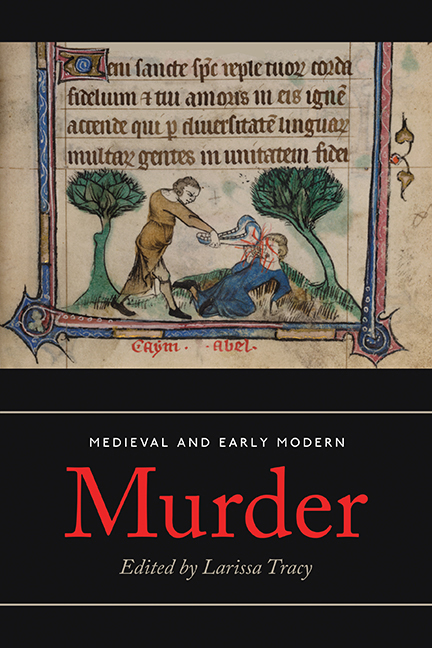Book contents
- Frontmatter
- Contents
- List of Illustrations and Tables
- Acknowledgements
- Contributors
- List of Abbreviations
- Introduction: Murder Most Foul
- I Murder on Trial: Justice, Law and Society
- II The Public Hermeneutics of Murder: Interpretation and Context
- III Murder in the Community: Gender, Youth And Family
- 13 Negotiating Murder in the Historiae of Gregory of Tours
- 14 Poisoning, Killing and Murder in the Edictus Rothari
- 15 Murder, Foul and Fair, in Shota Rustaveli's The Man in the Panther Skin
- 16 A Multiple Poisoning in the City of Valencia: Sanxo Calbó's Crime (1442)
- 17 A Case of Mariticide in Late Medieval France
- 18 Monstrous Un-Making: Maternal Infanticide and Female Agency in Early Modern England
- 19 Imps of Hell: Young People, Murder and the Early English Press
- Conclusion
- Select Bibliography
- Index
15 - Murder, Foul and Fair, in Shota Rustaveli's The Man in the Panther Skin
from III - Murder in the Community: Gender, Youth And Family
Published online by Cambridge University Press: 05 July 2018
- Frontmatter
- Contents
- List of Illustrations and Tables
- Acknowledgements
- Contributors
- List of Abbreviations
- Introduction: Murder Most Foul
- I Murder on Trial: Justice, Law and Society
- II The Public Hermeneutics of Murder: Interpretation and Context
- III Murder in the Community: Gender, Youth And Family
- 13 Negotiating Murder in the Historiae of Gregory of Tours
- 14 Poisoning, Killing and Murder in the Edictus Rothari
- 15 Murder, Foul and Fair, in Shota Rustaveli's The Man in the Panther Skin
- 16 A Multiple Poisoning in the City of Valencia: Sanxo Calbó's Crime (1442)
- 17 A Case of Mariticide in Late Medieval France
- 18 Monstrous Un-Making: Maternal Infanticide and Female Agency in Early Modern England
- 19 Imps of Hell: Young People, Murder and the Early English Press
- Conclusion
- Select Bibliography
- Index
Summary
SHOTA RUSTAVELI WROTE his approximately 6,300-line epic poem vep'xistqaosani around 1200 CE in the Caucasus, in Georgia. The title has been translated in various ways, although the literal translation, In the Leopard Skin, adequately conveys the theme of the poem: The hero is caught in his animal nature, and the poem tells of his battle to free and control himself. There are five English translations: The Man in the Panther's Skin by Marjorie Wardrop, The Knight in Panther Skin by Katherine Vivian, The Knight in the Panther's Skin by Venera Urushadze, The Lord of the Panther-skin by Robert H. Stevenson and The Knight in the Panther Skin by Dodona Kiziria and Lyn Coffin. The animal whose skin is so important is called vep'xi in Old Georgian, meaning ‘leopard’. In Modern Georgian, vep'xvi, with an additional v, has come to mean ‘tiger’; translations use ‘panther’ or ‘tiger’, perhaps because of the meaning of Modern Georgian vep'xvi. Little is known about the author, whose name means ‘Shota from Rustavi’; there are two Georgian towns by that name. He is rumoured to have been a high court official at the court of Queen Tamar (1184–1213). In 1960, the Russian Academy of Sciences organised an expedition to the Monastery of the Cross in Jerusalem where they found, on a pillar, a fresco of Maxim the Confessor and John of Damascus; between them was the small figure of a kneeling man with a long white beard, accompanied by an epitaph in clumsy Old Georgian asomtavruli letters that reads: ‘amis damxat'avsa šotas š[eundve] s ġ[mertma]n [a]min! rust[a]v[e]li’ [May God forgive Shota, the painter of this, amen! Rustaveli]. The Man in the Panther Skin (hereafter MPS) has a place in Georgian culture similar to the Bible and Shakespeare's works in Englishspeaking countries: it is a source of quotations, proverbs and role models. Its importance is illustrated by the fact that it used to be a part of every Georgian woman's trousseau. ‘Tinatin’, the name of one of the heroines, is a popular name.
- Type
- Chapter
- Information
- Medieval and Early Modern MurderLegal, Literary and Historical Contexts, pp. 350 - 370Publisher: Boydell & BrewerPrint publication year: 2018



